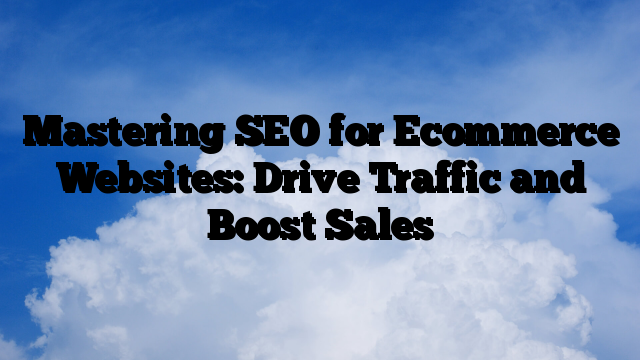Mastering SEO for Ecommerce Websites: Drive Traffic and Boost Sales

Elevate Your Dental Practice: SEO for Dentists
October 19, 2023
Boost Your Etsy Shop with Effective SEO Strategies
October 19, 2023In today’s digital age, an online presence is essential for any business, SEO for Ecommerce Websites, this holds especially true. To stand out in the crowded online marketplace and attract potential customers, you need to implement effective SEO strategies. Search Engine Optimization (SEO) is the key to improving your website’s visibility on search engines like Google, Bing, and Yahoo. In this article, we will explore the best SEO for ecommerce websites to help you drive more traffic and increase your sales.
SEO for Ecommerce Websites: A Comprehensive Guide
Search engine optimization (SEO) is the process of optimizing your website so that it ranks higher in search engine results pages (SERPs). This is important for all websites, but it is especially important for ecommerce websites, as it can help you drive more traffic to your site and increase your sales.
There are many different factors that affect how well your website ranks in SERPs, including the quality and relevance of your content, the use of appropriate keywords, and the number and quality of backlinks pointing to your site.
In this guide, we will walk you through the key steps of SEO for ecommerce websites, including:
- Keyword research: Identifying the right keywords to target is essential for SEO success. You need to choose keywords that are relevant to your products or services and that have a good search volume.
- On-page SEO: On-page SEO refers to the optimization of your website’s content and structure. This includes factors such as using your target keywords in your titles, headings, and throughout your content, as well as having a well-structured website with clear navigation.
- Technical SEO: Technical SEO refers to the underlying structure and code of your website. This includes factors such as site speed, mobile-friendliness, and XML sitemaps.
- Link building: Link building is the process of getting other websites to link to your site. Backlinks are a signal to search engines that your website is authoritative and trustworthy, and they can help you improve your rankings.
Keyword research
The first step in SEO for ecommerce websites is to conduct keyword research. This involves identifying the keywords that your target audience is using to search for products or services like yours.
There are a number of different keyword research tools available, such as Google Keyword Planner and SEMrush. These tools can help you identify relevant keywords, as well as their search volume and competition.
Once you have a list of keywords, you need to prioritize them. This can be done by considering the following factors:
- Search volume: How many people are searching for this keyword?
- Competition: How difficult is it to rank for this keyword?
- Intent: What is the intent of people who are searching for this keyword? Are they looking to buy a product, learn more about a topic, or something else?
On-page SEO for Ecommerce Websites
Once you have identified your target keywords, you need to optimize your website for them. This is known as on-page SEO.
Here are some key on-page SEO tips for ecommerce websites:
- Use your target keywords in your titles, headings, and throughout your content. However, avoid keyword stuffing, which is the practice of overusing keywords in a way that makes your content sound unnatural.
- Write informative and engaging product descriptions. Your product descriptions should clearly and accurately describe your products, and they should also include your target keywords.
- Use images and videos on your website. Images and videos can help to make your website more visually appealing and engaging, and they can also help to improve your rankings for relevant keywords.
- Optimize your website for mobile devices. More and more people are using their smartphones and tablets to browse the web, so it is important to make sure that your website looks good and functions well on mobile devices.
Technical SEO for Ecommerce Websites
Technical SEO refers to the underlying structure and code of your website. It is important to have a well-structured website with clear navigation and fast page loading speeds.
Here are some key technical SEO tips for ecommerce websites:
- Create an XML sitemap. An XML sitemap is a file that lists all of the pages on your website. This helps search engines to crawl and index your website more easily.
- Make sure your website is mobile-friendly. More and more people are using their smartphones and tablets to browse the web, so it is important to make sure that your website looks good and functions well on mobile devices.
- Improve your website’s page loading speeds. Page loading speed is a factor that search engines consider when ranking websites. You can improve your website’s page loading speeds by optimizing your images, reducing the number of plugins you use, and using a caching plugin.
Link building
Link building is the process of getting other websites to link to your site. Backlinks are a signal to search engines that your website is authoritative and trustworthy, and they can help you improve your rankings.
There are a number of different ways to get backlinks. Some of the most common methods include:
- Guest blogging: Writing guest blog posts for other websites in your industry.
- Creating high-quality content that other websites will want to link to.
- Promoting your content on social media.
- Building relationships with other website owners.
Conclusion
SEO is an important part of any ecommerce marketing strategy. By following the tips in this guide, you can improve your website’s SEO and drive more traffic to your
Call to action:
If you need help with your ecommerce website’s SEO, contact Leciel Technologies today. We have a team of experienced SEO experts who can help you optimize your website for search engines and drive more traffic to your site.
Additional tips for SEO for ecommerce websites:
- Use schema markup: Schema markup is a way to provide additional information about your website to search engines. This information can be used to display your website in richer search results, such as product carousels and knowledge graphs.
- Create a blog: A blog is a great way to create fresh, informative content that can help you attract new visitors to your website and improve your SEO rankings.
- Promote your products and services on social media: Social media is a great way to connect with potential customers and promote your products and services. Be sure to share your blog posts, product listings, and other relevant content on social media.
- Track your SEO results: It is important to track your SEO results so that you can see what is working and what is not. There are a number of different SEO tracking tools available, such as Google Analytics and SEMrush.
SEO is an ongoing process, and it takes time to see results. However, by following the tips in this guide, you can start to improve SEO for Ecommerce Websites and drive more traffic to your site.




